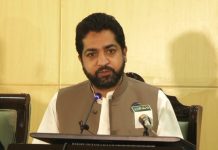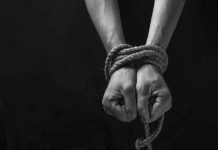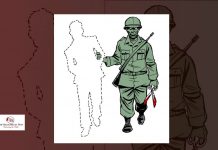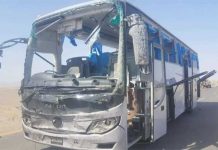One of the main pro-freedom political parties, Baloch National Movement (BNM) on Wednesday demanded urgent and unconditional release of all Baloch and Sindhi missing persons including Punhal Sario, the Convenor of Voice for Missing Persons of Sindh.
These demands were made in National press club Washington DC by the Secretary General of BNM North America, Nabi Baksh Baloch. He was addressing the press about the grave human rights violations in Balochistan and Sindh by Pakistani security forces.
He said that BNM demands urgent release of Punhal Sario from unlawful detention in Pakistan and immediate stoppage of enforced disappearances of Baloch and Sindhi Activists.
Punhal Sario, Convenor, Voice for Missing Persons of Sindh, was abducted on August 3, 2017 from Hyderabad, Sindh by the Pakistani Inter-Services Intelligence (ISI) personnel and disappeared without a trace.
Surprisingly, Punhal Sario reached his home late on Wednesday. Baloch political activists believe the release was a mere coincidence as such demands in past have “fallen on deaf ears”.
Sario’s family said he was dropped off by unknown men near the Kotri Barrage bridge. Sario, who heads the Sindh Hari Porhiyat Council [Sindh Peasants Labourers’ Council] led a campaign for missing persons. He is said to be physically fine and completely in his senses.
Below is the transcript of Nabi Baksh Baloch’s press briefing:
On behalf of the people of Balochistan and my affiliated political organization, the Baloch National Movement (BNM) I would like to thank Sindhi Foundation for honouring me with this opportunity to add my voice to the call for immediate and safe of recovery of Punhal Sario from the torture chambers of Pakistani gestapo –the ISI.
We believe that forced disappearances and targeted killings of Sindhi nationalists is part of a larger scheme of the Pakistani state forces to erase all forms of political, cultural identities and voices that represent Sindh’s heritage, its people and the freedom movements that are a challenge to militarism and Islamic extremism.
In expressing solidarity with my Sindhi brethren, I would like to inform the media and rights groups in the West that people of Balochistan are suffering from the worst human rights violations in our entire history. Pakistan’s armed forces are on a genocidal military campaign in Balochistan backed by its strategic partner, China. Since 2003, more than 20,000 Baloch civilians, students, teachers, lawyers, doctors and women have been forced disappeared by the Pakistani intelligence agencies, and their death squads. A large number of the disappeared youth are constantly being dumped in the fields after brutal torture and in-custody executions.
Kill and Dump
On April 9, 2009, the mutilated, bullet-riddled body of Ghulam Mohammed Baloch, Chairman, Baloch National Movement was discovered at Murgab near Turbat, Balochistan. He was abducted in broad daylight from the office of his friend and lawyer, advocate Kachkol Ali who happened to be a Member of Parliament and the leader of the Opposition in Balochistan Assembly at the time. He was taken away by the ISI escorted by army vehicles along with two of his colleagues – Lala Munir, and Sher Mohammad Baloch of the Baloch Republican Party. All three were brutally tortured, executedand dumped at the same location five days later. That was the beginning of the so-called “kill & dump” policy in Balochistan initiated during the Presidency of Asif Ali Zardari.Since then, new dimensions of human rights violations have been introduced in Balochistan by the armed forces of Pakistan.
Mass Graves
In late January 2014, a shepherd had spotted a mass grave in district Khuzdar’s Totak area. Later discoveries revealed at least three mass graves with a body count of 17 confirmed by the government sources while Balochistan-based rights groups stated that the actual figure was much higher. Since the whole area was sealed off from public scrutiny and independent reporters, the truth will never be revealed and the debate on the actual numbers today ranges from 17 to 169. Following the discovery of Tutak, a number of mass graves have emerged in far off areas of Balochistan including Dera Bugti and the Padrak area of district Kech in Makran division.Nevertheless, this particular mass grave brought two facts into public notice:
Identification of some of the bodies revealed that they were forced disappeared months earlier from various parts of Balochistan. Therefore, it proved that this site was a burial ground of the persons disappeared and killed by the Pakistani security forces and its death squads. The three bodies discovered from the Tutak mass graves identified as Qadir Bakhsh, Umar and Naseer were on the list of missing persons. Umar and Naseer, both brothers were abducted by Pakistan Army on October 14, 2013 from Awaran during the earthquake relief operations. Qadir Bakhsh was forced disappeared by army soldiers on September 15, 2013 also from Awaran.
This particular site was the basecamp of Shafiq Mengal, the notorious head of a death squad that operates in Khuzdar under the protection of Pakistan Army. And the discovery of this mass grave site established a link between Pakistani army and the death squads they have commissioned to abduct, torture and kill Baloch rights activists. Many of the activists taken away by army during the operations on villages were then handed over to these locally formed death squads to torture the victims, extract information and execute them. And similarly, politically high value victims abducted by local death squads would be passed on to the military run torture chambers.
State-sponsored Death Squads
The phenomenon of death squads is new to Balochistan and is actually an off-shoot of the Islamist jihadist culture stemming from the Pakistan Army’s military need to create non-state actors to do their dirty work. It is comprised of Islamic extremist elements, criminal elements and the drug mafia. The death squad members are mostly trained by ISI and the jihadist outfits such as Jamaat-ud-Dawa, Lashkar-e-Jhangvi and the Lashkar-e-Khorasan (the ISIS in Balochistan). The objective of the local networks of death squads is to abduct, torture, target-kill Baloch rights activists and create fear among the local populace.
Fake Encounters and Murders of Victims of Enforced Disappearances
In many of the recent military operations in Balochistan, Pakistan Army has adopted a new method of killing victims of forced disappearances and faking it as encounters with militants.Many such victims of fake encounters were actually forced disappeared persons whose names were traced from lists published months earlier by rights groups.
From a long list of enforced disappeared by Pakistan Army, I would like to bring to present here few names that have been highlighted in the past as well:
Zahid Baloch, former Chairman, Baloch Students Organization-Azad, forced disappeared from Quetta, Balochistan on March 18, 2014.
Shabir Baloch, Secretary-Information, Baloch Students Organization-Azad, forced disappeared from Gowarkop, Balochistan on October 4, 2016.
Zakir Majeed, former Vice Chairman, Baloch Students Organization-Azad, forced disappeared from Mastung, Balochistan on June 8, 2009.
Dr. Deen Mohammed, affiliated with Baloch National Movement, forced disappeared from Civil Hospital in Khuzdar, Balochistan on June 28, 2009.
Mohammad Ramzan Baloch, affiliated with Baloch National Movement, forced disappeared from Gwadar, Balochistan on July 25, 2010.
The patterns of state repression in Balochistan have evolved in the years during the successive Pakistani governments – from military to civilian – and the barbarism has grown from bad to worse, heading toward a policy of full-scale genocide and annihilation of the Baloch nation.
China-Pakistan Economic Corridor is now the key ingredient to the spread of human rights violations across Balochistan along the route of its construction sites leaving a trail of burned villages and destroyed homes in its wake. Baloch people are paying a heavy price for their freedom from the state of terrorism called Pakistan. And while the Baloch and Sindhis are being butchered by the Pakistan Army, the United Nation is not only silent but rubbing salt to our wounds by electing Pakistan as a member of the UN Human Rights Council.






























